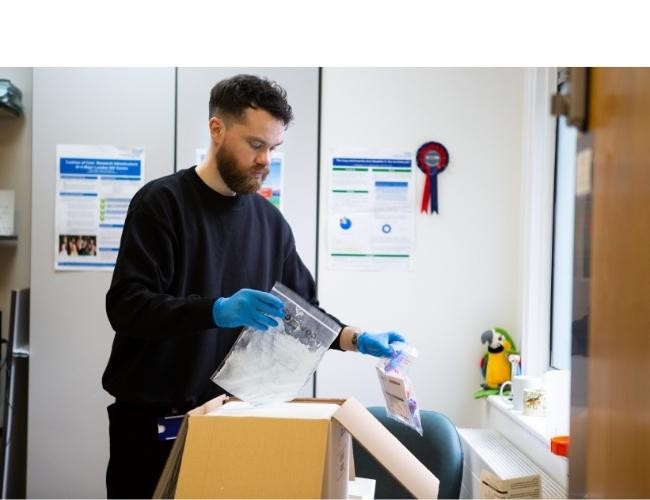We provide a friendly, comprehensive service and world class care for those living with HIV.
If you are concerned you may have HIV, early symptoms of HIV or have been exposed to HIV, then we would be very happy to help you.
Our service is open-access, which means you do not need to be referred to the clinic by a GP or other healthcare professional.
We provide a confidential service where we will not notify your GP, partner, friends, or family without your permission.
The Royal Free London’s HIV services clinics are the Ian Charleson Day Centre (ICDC) at the Royal Free Hospital and the Alexander Pringle Centre at the North Middlesex Hospital. Both centres offer advice, counselling, treatment, and ongoing monitoring (including blood tests) for anyone affected by HIV.
We have several in-house specialists who look after a wide variety of related health conditions including kidney, heart, lung and/or metabolic issues and offer clinics to look after people with more than one infection (such as tuberculosis or hepatitis).
We also have several dedicated services including:
-
ageing and frailty
-
women’s healthcare with gynaecological, contraception and menopause advice
-
a HIV antenatal team
-
a pharmacy service providing specialist advice on HIV and other drugs
-
psychological and psychiatric support
-
an inpatient unit where we look after people living with HIV who need to be in hospital
-
weight loss service
Sexual health services, provided by Central North West London NHS Foundation Trust (CNWL), are also available for registered ICDC patients.
Ian Charleson Day Centre referrals
You can refer yourself to our service if you would like an HIV test or if you are living with HIV and would like to access HIV care with us.
We also accept referrals from any healthcare professional.
Alexander Pringle Centre referrals
A same or next day appointment can usually be arranged, Monday to Friday. Non-urgent patients can be seen within one week.
GPs and health partners can refer a patient by calling 020 8887 3701.
Patients can also self-refer by calling 020 8887 3701.
Our emergency walk-in service is available:
- Monday, Tuesday, Thursday and Friday: 9am to 4pm.
- First, second, and third Wednesday of each month: 10am to 4pm
- Fourth Wednesday of each month: 1pm to 4pm
If possible, please call the ICDC nurses first on 020 3758 2029 (option 2).
They will be able to offer advice as to whether it might be better to see your GP, go to our emergency department, or book you in to see us.
We can give short-term antiviral prescriptions, but may ask you to get other medication from your GP.
For out of hours services, please call the nurses on 11 South ward for advice on 020 7830 2712 between 5pm and 9am every day, including bank holidays.
If you are worried about HIV or a recent exposure to HIV, you can get tested at ICDC or the Alexander Pringle Centre. You do not need to make an appointment, you can simply walk in during clinic hours. The test involves a finger prick and the result is available in minutes.
If you have a blood test while in any of our emergency departments, it is now checked for HIV and hepatitis B and C. The tests are routine, the same as your usual blood test.
Many people with these conditions do not know they have them because symptoms can take years to show.
It is important to diagnose HIV or hepatitis B or C early as treatment is life-saving and free with the NHS. With medication you can expect to live long and well and it helps stop passing it on too.
Your results are strictly confidential, meaning they are private and only healthcare professionals who help you know.
HIV, hepatitis B and C are manageable long-term conditions and it is best to diagnose them as early as possible before they begin to harm your health. Without treatment, the effects can become life-threatening.
All patients over the age of 16 are checked as part of routine blood testing for our emergency department. This is in line with NICE national guidance.
With the right treatment, you can expect to live long and well.
It is always better to know your HIV status to check if you need life-saving treatment.
If you decide you do not want a test, please let the member of staff taking your bloods know.
Will I get a result if the test is negative?
No, we will only contact you if it is positive. Sometimes the result can be unclear, in this situation we would contact you to ask to re-test you.
No, we will only contact you if it is positive. Sometimes the result can be unclear, in this situation we would contact you to ask to re-test you.
Your results are confidential and we will only share your result with our NHS specialists so that you receive the right care.
We will contact you to ask you to return for a repeat test in order to confirm the diagnosis and discuss your treatment.
Therapies are extremely safe and effective and allow your body to repair the damage to your immune system. People on effective medication live well.
We are encouraging everyone who does not already know whether they have these conditions to have the test. Knowing and getting treatment can save your life.
If you do not want this, please tell the person who is taking your blood so they can ensure that you are not tested.
Only NHS staff that already have access to your confidential health record will see your result. This will include your GP and other hospital trusts involved in your care.
If you do not want to be tested, please let a member of staff know.
If you are a registered ICDC or Alexander Pringle Centre patient, you can use our 'walk-in' service for blood tests and you will not need to make an appointment.
Blood tests are usually recommended every six months for most patients.
Sometimes we may need to monitor your blood test results more frequently — our team will let you know if this is the case.
If you are a registered ICDC or Alexander Pringle Centre patient, you are also able to use our sexual health service provided by CNWL. Visit our sexual health services page for more information.
For routine asymptomatic sexually transmitted infection (STI) screening, self-sampling kits are available for ICDC or Alexander Pringle Centre registered patients.
You might find more useful information and support on the following webpages:
For updates on our services and other HIV related issues, you can follow us on X @ICDCRoyalFree.
 Translate
Translate








